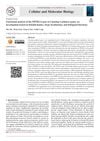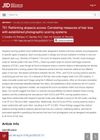 July 2018 in “Elsevier eBooks”
July 2018 in “Elsevier eBooks” New hair loss treatments show promise, but more research is needed to confirm their effectiveness.
 December 2024 in “Tropical Journal of Natural Product Research”
December 2024 in “Tropical Journal of Natural Product Research” CTUMP's Herb shampoo promotes faster and denser hair growth.
[object Object]  March 2017 in “bioRxiv (Cold Spring Harbor Laboratory)”
March 2017 in “bioRxiv (Cold Spring Harbor Laboratory)” Plant root hair growth is controlled by the hormone auxin, which affects the production of certain oxygen-related molecules through a specific process.
106 citations,
January 2013 in “Clinical and Developmental Immunology” Alopecia areata is caused by immune system attacks on hair follicles, often triggered by viral infections.
 19 citations,
January 2001 in “Journal of cutaneous laser therapy”
19 citations,
January 2001 in “Journal of cutaneous laser therapy” The Nd:YAG laser safely reduces facial hair and slows regrowth, with patient satisfaction.
 31 citations,
March 2013 in “Gene”
31 citations,
March 2013 in “Gene” Signaling pathways are crucial for hair growth in goats.
1 citations,
January 2023 in “Skin Appendage Disorders” Radiofrequency devices can help remove or grow hair, but more research is needed.
 July 2007 in “Faculty Opinions – Post-Publication Peer Review of the Biomedical Literature”
July 2007 in “Faculty Opinions – Post-Publication Peer Review of the Biomedical Literature” The BASP classification is a detailed system for categorizing hair loss in both men and women, but it may be complex for beginners and not fully suitable for grading female hair loss.
84 citations,
April 2015 in “Cosmetics” Hair dyes vary in how long they last and how deeply they penetrate hair.
 28 citations,
January 2011 in “Hearing Research”
28 citations,
January 2011 in “Hearing Research” Gene therapy, especially using atoh1, shows promise for creating functional sensory hair cells in the inner ear, but dosing and side effects need to be managed for clinical application.
 21 citations,
April 2012 in “European Journal of Pharmaceutics and Biopharmaceutics”
21 citations,
April 2012 in “European Journal of Pharmaceutics and Biopharmaceutics” The gel with special fat-loaded particles from rice bran could be an effective skin treatment for hair loss.
1 citations,
December 2022 in “Journal of Controlled Release” Microneedles could be a better and easier way to regrow hair.
 16 citations,
March 2014 in “Journal of the European Academy of Dermatology and Venereology”
16 citations,
March 2014 in “Journal of the European Academy of Dermatology and Venereology” Korean patients with PCOS often have skin problems like acne and excess hair, with different symptoms based on their specific PCOS type.
 6 citations,
March 2020 in “Journal of International Medical Research”
6 citations,
March 2020 in “Journal of International Medical Research” Early hair loss common in Chinese males, linked to family history and smoking; early treatment advised.
 7 citations,
January 2007 in “Elsevier eBooks”
7 citations,
January 2007 in “Elsevier eBooks” Shampoos clean hair mainly with surfactants and have added ingredients for extra benefits.
 January 2006 in “Elsevier eBooks”
January 2006 in “Elsevier eBooks” Cats with Feline Symmetrical Alopecia can regrow hair with proper treatment based on the specific cause, including diet, medication, or stress management.
 7 citations,
January 2018 in “Medicinski arhiv”
7 citations,
January 2018 in “Medicinski arhiv” A herbal extract may help treat certain types of hair loss by reducing a specific gene's activity.
16 citations,
April 2020 in “Dermatology practical & conceptual” Laser treatment can effectively reduce unwanted hair growth, particularly for people with fair skin and dark hair.
 10 citations,
April 2016 in “Research and reports in transdermal drug delivery”
10 citations,
April 2016 in “Research and reports in transdermal drug delivery” Transfollicular drug delivery is promising but needs more research to improve and understand it better.
 1 citations,
January 2024 in “Nature communications”
1 citations,
January 2024 in “Nature communications” Activating TLR5 in the gut can extend lifespan and improve health in aged mice.
 January 2025 in “Cellular and Molecular Biology”
January 2025 in “Cellular and Molecular Biology” The PIP5K1A gene helps cashmere growth in goats by promoting cell proliferation, and melatonin boosts its expression.
 July 2023 in “Journal of Cosmetic Dermatology”
July 2023 in “Journal of Cosmetic Dermatology” Ethosomes could improve how well skin treatments work, but more research is needed on their safety and stability.
 11 citations,
February 2019 in “Frontiers in Physiology”
11 citations,
February 2019 in “Frontiers in Physiology” Hair properties are interconnected; a comprehensive, cross-disciplinary approach is essential for understanding hair behavior.
 3 citations,
January 2022 in “Pharmaceutics”
3 citations,
January 2022 in “Pharmaceutics” Nanostructured delivery systems could potentially improve hair loss treatment by targeting drugs to hair follicles, reducing side effects and dosage, but the best size, charge, and materials for these systems need further investigation.
92 citations,
September 2013 in “Journal of Investigative Dermatology” BMAL1 and Period1 genes can influence human hair growth.
 July 2022 in “Journal of Investigative Dermatology”
July 2022 in “Journal of Investigative Dermatology” The conclusion suggests that a new system for measuring hair loss could be created using automated analysis of photographs.
 January 2004 in “Hair transplant forum international”
January 2004 in “Hair transplant forum international” Cell therapy could potentially treat hair loss, but we need lab tests to check if it can create hair follicles.
16 citations,
January 2021 in “Frontiers in veterinary science” Pigs in farrowing crates and loose-housing systems showed no difference in chronic stress levels as measured by hair cortisol.
 August 2022 in “Gene Reports”
August 2022 in “Gene Reports” New hair loss treatments could be improved by using combined biological markers.
[object Object]  136 citations,
February 2017 in “International Journal of Molecular Sciences”
136 citations,
February 2017 in “International Journal of Molecular Sciences” PRP treatment improves hair growth, and the device used can affect results, with some being more effective.























